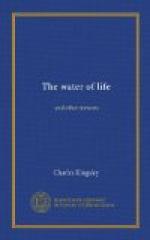My friends, think of these things, especially at this rich and blessed harvest-time; and while you thank your God and your Saviour for His unexampled bounty in this year’s good harvest, do not forget to thank Him for having given the sowing and the reaping of those crops to you; and for having called you to that business in life in which, I verily believe, you will find it most easy to serve and obey Him, and be least tempted to ambition and speculation, and the lust of riches, and the pride which goes before a fall.
Think of these things; and think of the exceeding mercies which God heaps on you as Englishmen,—peace and safety, freedom and just laws, the knowledge of His Bible, the teaching of His Church, and all that man needs for body and soul. Let those who have thanked God already, thank Him still more earnestly, and show their thankfulness not only in their lips, but in their lives; and let those who have not thanked Him, awake, and learn, as St. Paul bids them, from God’s own witness of Himself, in that He has sent them fruitful seasons, filling their hearts with food and gladness: —let them learn, I say, from that, that they have a Father in heaven who has given them His only-begotten Son, and will with Him freely give them all things needful: only asking in return that they should obey His laws—to obey which is everlasting life.
SERMON XII. PROGRESS (Preached before the Queen at Clifden, June 3, 1866.)
Ecclesiastes vii. 10,
Say not thou, What is the cause that the former days were better than these? for thou dost not inquire wisely concerning this.
This text occurs in the Book of Ecclesiastes, which has been for many centuries generally attributed to Solomon the son of David. I say generally, because, not only among later critics, but even among the ancient Jewish Rabbis, there have been those who doubted or denied that Solomon was its author.
I cannot presume to decide on such a question: but it seems to me most probable, that the old tradition is right, even though the book may have suffered alterations, both in form and in language: but any later author, personating Solomon, would surely have put into his month very different words from those of Ecclesiastes. Solomon was the ideal hero-king of the later Jews. Stories of his superhuman wealth, of magical power, of a fabulous extent of dominion, grew up about his name. He who was said to control, by means of his wondrous seal, the genii of earth and air, would scarcely have been represented as a disappointed and broken-hearted sage, who pronounced all human labour to be vanity and vexation of spirit; who saw but one event for the righteous and the wicked, and the wise man and the fool; and questioned bitterly whether there was any future state, any pre-eminence in man over the brute.




